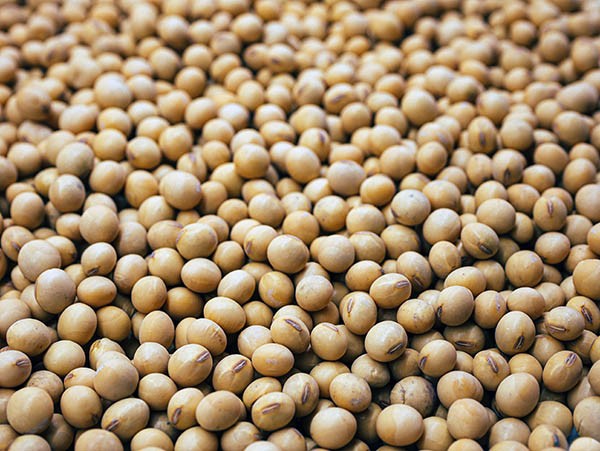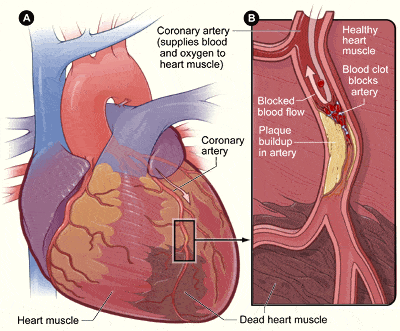Modified Soybeans May Provide Cardiovascular Benefits
Mouse Study Suggests Simple Ingredient Swap Could Improve Public Health

Because soybean oil is found in so many processed foods, changing the balance of different types of dietary fat in soybeans might improve heart health without requiring people to change their eating habits.
When it comes to consuming a healthy diet, “everything in moderation” is a common piece of advice. In fact, evidence is accumulating that eating lots of a particular dietary fat thought to promote cardiovascular health may actually be problematic. A recent IRP study performed in mice suggests that vegetable oil made from a modified soybean may decrease the risk for cardiovascular disease by helping people strike the right balance in their consumption of two different types of fat.1
While scientists have long debated the health effects of dietary cholesterol and saturated fat, so-called ‘polyunsaturated’ and ‘monounsaturated’ fat have consistently been considered ‘heart-healthy’ because they reduce levels of VLDL and LDL cholesterol in the blood. Those types of cholesterol raise the risk of a heart attack or stroke by promoting the build-up of plaques in blood vessels, a process known as atherosclerosis. However, evidence has emerged in recent years suggesting that idea may be over-simplified2 and cardiovascular health can be improved by consuming the right balance of two varieties of polyunsaturated fat, known respectively as ‘omega-3’ and ‘omega-6’ fat.
“Fatty acids aren’t just an energy source,” says IRP scientist Zhi-Hong Yang, Ph.D., who led the new study in the lab of IRP senior investigator Alan T. Remaley, M.D., Ph.D. “They’re also a precursor to a diversity of mediators. Omega-3 fatty acids produce anti-inflammatory mediators and omega-6 produce pro-inflammatory mediators. The theory is that the lower the omega-6 to omega-3 ratio is, the better.”
Right now, most Americans consume way more omega-6 fat than omega-3 fat mostly because they consume so much processed food containing soybean oil, which is rich in omega-6 fat. However, agricultural companies have recently begun producing a variety of modified soybean that is not only more chemically stable and has a better taste profile than conventional soybeans, but also contains less omega-6 fat and more omega-3 fat and monounsaturated fat.

This diagram shows how the buildup of plaques in blood vessels, known as atherosclerosis, can harm the heart.
In the new study, Dr. Yang, Dr. Remaley, and their colleagues compared the health effects in mice of that modified soybean oil to those of conventional soybean oil that is high in omega-6 fat. The study used a variety of mouse that tends to develop atherosclerosis when fed a diet similar to the standard American diet, which contains high amounts of saturated fat. The researchers fed the mice one of three diets that were nearly identical in their calorie, carbohydrate, fat, and protein content. However, the dietary fat in one of the diets came mostly from saturated fat. In the other two diets, the main fat source was either omega-6-rich conventional soybean oil or the modified soybean oil that contains more monounsaturated fat and a more balanced ratio of omega-6 to omega-3 polyunsaturated fat.
After 12 weeks, the mice fed conventional soybean oil had much lower levels of VLDL and LDL cholesterol in their blood compared to the mice fed lots of saturated fat. However, to the researchers’ surprise, the mice on those two diets had the same amount of plaque buildup in their arteries, suggesting a diet high in omega-6 polyunsaturated fat but low in omega-3 polyunsaturated fat might be just as bad for cardiovascular health as a diet high in saturated fat.
On the other hand, the diet containing modified soybean oil caused a smaller decrease in VLDL and LDL cholesterol than the diet containing conventional soybean oil, but it led to much lower levels of plaque buildup in the animals’ arteries than either of the other two diets. Not only do those findings suggest that the modified soybean oil may be better for cardiovascular health than the conventional version, but they also appear to contradict the long-held belief that lower levels of blood cholesterol reduce the development of plaques in blood vessels.

Dr. Zhi-Hong Yang
“We need to be careful about blood cholesterol,” says Dr. Yang. “These days, that’s become kind of the gold standard, but we should not over-state its effect. In general, it is good to reduce it, but sometimes the lower cholesterol induced by traditional soybean oil is not associated with reduced atherosclerosis.”
“LDL for sure is important and we don’t want to mislead people, but half the time when people have heart attacks or cardiovascular disease, they don’t really have bad cholesterol levels, so we already know it’s not the whole story,” adds Dr. Remaley.
What’s more, when the mice were exposed to a bacterial toxin that provokes an immune response, those fed the modified soybean oil had significantly lower levels of molecules that promote inflammation and higher levels of molecules that decrease inflammation compared to the other two groups of mice. The diet containing the modified soybean oil also decreased the activity of inflammation-promoting genes in the animals’ livers and fat cells.

Dr. Alan T. Remaley
“You need LDL deposited into the vessel wall, but you also need ongoing inflammation for atherosclerosis to develop,” explains Dr. Remaley. “I think most people in the field would say that inflammation is a very important element of atherosclerosis.”
Because this study was performed in mice and not people, Dr. Yang and Dr. Remaley are hesitant to draw strong conclusions from it about how different types of fat affect human cardiovascular health. However, if human studies echo the results of their animal experiments, there would be a strong case that increasing the amount of omega-3 fat and decreasing the amount of omega-6 fat that people consume might reduce their risk for heart attacks and strokes. Since dietary advice often falls on deaf ears, such a change could be made on a society-wide level simply by switching out the conventional soybean oil currently used in many processed foods for the modified soybean oil tested in the IRP study.
“It’s hard to follow health advice, and we eat a lot of processed food,” Dr. Remaley says. “It would be wonderful if we could make the path of least resistance, eating processed food, more healthy. That could have a bigger impact than trying to get people to change their behavior.”
Subscribe to our weekly newsletter to stay up-to-date on the latest breakthroughs in the NIH Intramural Research Program.
References:
[1] Yang Z, Nill K, Takechi-Harava Y, Playford MP, Nguyen D, Yi Z, Pryor M, Tang J, Roiulpote KV, Mehta NN, Wen H, Remaley AT. Differential Effect of Dietary Supplementation with a Soybean Oil Enriched in Oleic Acid versus Linoleic Acid on Plasma Lipids and Atherosclerosis in LDLR-Deficient Mice. Int J Mol Sci. 2022 Jul 29;23(15):8385. doi: 10.3390/ijms23158385.
[2] Ramsden CE, Zamora D, Majchrzak-Hong S, Faurot KR, Broste SK, Frantz RP, Davis JM, Ringel A, Schidran CM, Hibbeln JR. Re-evaluation of the traditional diet-heart hypothesis: analysis of recovered data from Minnesota Coronary Experiment (1968-73). BMJ. 2016 Apr 12;353:i1246. doi: 10.1136/bmj.i1246.
Related Blog Posts
This page was last updated on Tuesday, May 23, 2023
